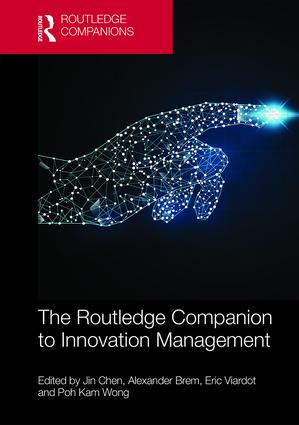
ISBN: 9781315276670
由清华大学经济管理学院陈劲教授、德国埃尔朗根-纽伦堡大学Alexander Brem教授、西班牙EADA商学院Eric Viardot教授、新加坡国立大学商学院Poh Kam Wong教授联袂主编的The Routledge Companion to Innovation Management一书,已于2019年2月由世界最大学术出版集团之一——Taylor & Francis Group旗下的Routledge出版社(劳特利奇出版社)正式出版,面向全球公开发行。
该创新管理手册汇聚了来自清华大学、北京大学、美国麻省理工学院、瑞典皇家理工学院、英国曼彻斯特大学、德国美因兹大学、德国亚琛工业大学、西班牙EADA商学院、荷兰蒂尔堡大学、新加坡国立大学等全球15个国家知名高等学府的创新管理领域顶尖专家的研究成果,作者包括Eric von Hippel、陈劲、Chang-Chieh Hang、Georges Haour、Kong-rae Lee、Wim Vanhaverbeke等。全书共分为五篇,即创新和创新管理概述、创新的战略视角、创新的组织视角、创新管理的制度和规范、创新管理方法。该手册以创新和创新管理的基本框架切入,从战略、组织、资源、制度和文化的视角,全面涵盖、重点聚焦创新管理的关键议题。
Routledge出版社是国际出版界知名学术出版机构,在人文科学及社会科学领域拥有150年的出版经验,以出版精品学术著作而著称。
推荐语
当今,创新实践正在发生根本性变化。例如,开放式创新和分布式创新的大量涌现对传统的封闭创新方式方法提出了挑战、给予了补充。该手册是对最新创新管理研究和实践的有益汇编,不仅反映了创新的变化,而且能够指导创新的变革。由陈劲教授及其合作者编撰的该手册具有极大价值。
——Eric von Hippel,麻省理工学院斯隆商学院教授,“用户创新”理论创始人
陈劲、Brem、Viardot和Wong四位教授主编的创新管理手册为创新领域的研究与实践提供了全面的、有价值的审视和调查——从特定的技术到组织的响应,以及面向中国等新兴市场的创新应用等。这本手册对于创新领域的每位学者而言都是一部必不可少的参考手册。
——Henry Chesbrough,加州大学伯克利分校哈斯商学院教授,“开放式创新”首创者
创新对于国家和区域竞争力提升的重要性不言而喻,创新也是企业和组织获取长期成功的必要战略。该手册阐述了开展创新的动机和原因,勾勒出有效进行创新管理、实现创新成功的路线图。该手册对学者开展创新研究、组织决策者有效管理创新以及政策制定者优化和完善创新政策等都是一部必读之作。
——Kenneth Huang,新加坡国立大学商学院教授
该手册内容全面而详实,架构清晰而完整。相比其他创新领域的书籍,该手册的一大特色是对各创新研究议题的宽度覆盖和深度挖掘。该手册汇集了全球创新领域知名学者的最新研究成果,对于每位创新研究者和实践者而言都具有极大的参考价值。
——Muammer Ozer,香港城市大学商学院教授
主编简介
陈劲
清华大学经济管理学院教授,清华大学技术创新研究中心主任,我国创新管理领域首位国家杰出青年基金、国务院政府特殊津贴、国家百千万人才、长江学者获得者,国家自然科学基金重大国际合作项目、国家哲学社会科学重大项目、北京市习近平新时代中国特色社会主义思想研究中心重大项目的首席专家。
Alexander Brem
Alexander Brem,埃尔朗根-纽伦堡大学教授,南丹麦大学麦斯克劳森研究所技术与创新管理领域教授。其与Eric Viardot主编的Evolution of Innovation Management:Trends in an International Context一书已由清华大学出版社引进出版,中文书名为《创新管理的演变:国际背景下的发展趋势》(清华创新经典丛书)。
Eric Viardot
西班牙EADA商学院(西班牙四大商学院之一)教授、全球创新管理中心主任。
Poh Kam Wong
Poh Kam Wong,新加坡国立大学商学院教授、创业中心主任,美国伯克利大学富布赖特奖学金获得者、斯坦福大学亚太研究中心的访问学者,新加坡年度全球创业观察研究(GEM)与斯坦福地区创业创新研究(SPRIE)的首席研究员。
全书目录
Part I: Introduction to Innovation and Innovation Management
1.Innovation and Innovation Management (Jin Chen, Eric Viardot and Alexander Brem)
2. Deliberate and Spontaneous: The Impact of Cognitive Disinhibition on People Management (Franc Ponti)
3. Connotation and Types of Innovation (Jin Chen and Ximing Yin)
4. The Fundamentals of Innovation Management (Petra Nylund)
5. The Systems Approach to Innovation Management (Magnus Karlsson and Mats Magnusson)
6. Innovation and Innovation Management in an Age of Changes (Jin Chen and Liang Mei)
Part II: The Strategic Perspective of Innovation
7.Strategic Management of Innovation (Emigdio Alfaro, Fei Yu, Naqeeb Ur Rehman, Eglantina Hysa and Patrice Kandolo Kabeya)
8.The Free Innovation Paradigm (Eric von Hippel)
9. Open Innovation (Yufen Chen and Wim Vanhaverbeke)
10. Bringing Open Innovation into Practice: Methods and Approaches (Sumit Mitra, Susanna Ghosh Mitra and Frank Piller)
11. R&D Strategies for Disruptive Innovation (Chang-Chieh Hang and Yi Ruan)
12.Smart Prototyping (Fei Yu and Bastian Enste)
13. Frugal Innovation: Developing and Managing Innovations in Resource-constrained Settings (Eugenia Rosca, Nivedita Agarwal and Jakob Schlegel)
14. Innovation in the Digital Age (Michael Dowling, Elizabeth Noll and Kristina Zisler)
15. Perspectives on Policies to Promote Convergence in Innovation (Kong-rae Lee)
16.Responsible Innovation: Origin, Attribution and Theoretical Framework (Liang Mei and Jin Chen)
17. Serendipity and Innovation: Beyond Planning and Experimental-Driven Exploration (Martin Kamprath and Tassilo Henike)
Part III: The Organizational Perspective of Innovation
18. Innovation Management Within the Organisation (Regina Lenart-Gansiniec)
19. Inter-organizational Relations within Innovation Systems (Terje Grønning and Parisa Afshin)
20. The Crucial Human Factor in Innovation (Georges Haour)
Part IV: Institution and Norms for Innovation Management
21.Institutional Design of Innovation towards the "Active Innovation Paradigm" (Dirk Meissner)
22. Ethics in Innovation Management as Meta-responsibility: The Practice of Responsible Research and Innovation in Human Brain Simulation (Bernd Carsten Stahl, Jos Timmermans, Stephen Rainey and Mark Shaw)
23. Intellectual Property and Innovation Management (Can Huang and Suli Zheng)
PART V: Methodologies for Innovation Management
24. Standards, Models and Methodologies for the Innovation Management (Emigdio Alfaro)
25.Technological Innovation Audit (Xuesong Geng)
26. Innovation Management Simulations using Agent-based Modelling (Petra Ahrweiler)
27. Technology Innovation Investment Portfolio Planning: A Systems Approach with Application Examples (Oliver Yu)
购买途径
购买链接如下:www.routledge.com/9781138244719
注:清华大学技术创新研究中心作为该书出版的重要统筹方,享有出版社提供的购书优惠(20%折扣)。如有购买意向,请联系本中心获得“购书优惠折扣码”,可发送邮件至yangzhh@sem.tsinghua.edu.cn。

